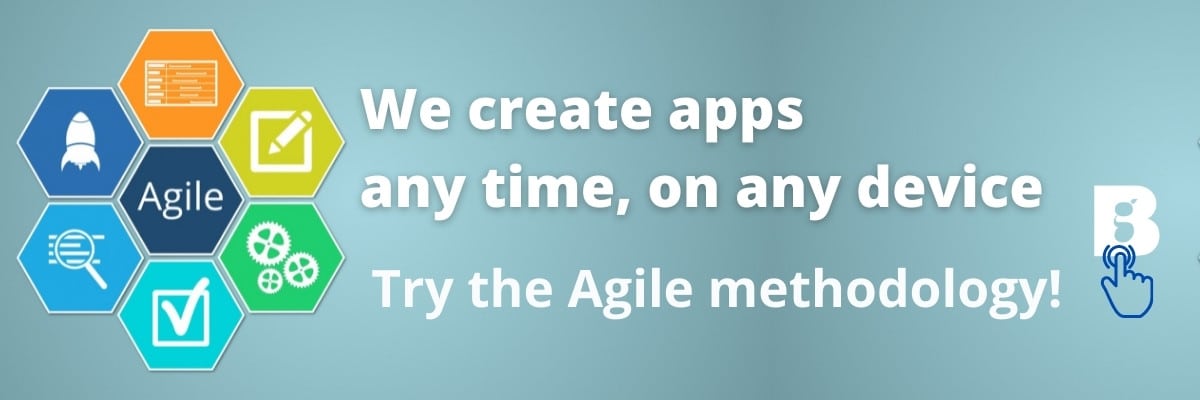The COVID-19 pandemic has led to a boom in the use of mobile apps. According to analytics firm App Annie, mobile app usage grew by 40% in 2020. The trend was especially strong in business applications, which were downloaded at twice the weekly rate seen in 2019.
We can expect this increased reliance on mobile apps at work to persist. And while household-name tech like Zoom or Microsoft Teams will continue to be used heavily, many organizations are also seeking to create their own tools to match specific needs.
Agile and low code mobile app development will make this possible. Let’s see how.
Why we need low code mobile app development
With COVID-19 likely to remain disruptive to business for months or even years to come, we will need to find ways to adapt. At the organizational level, this is about being ready to respond to sudden changes in operations, quickly react to crises, and find ways to shift workflows and processes fast. And agile mobile app development can effectively support organizations to do this.
Low code mobile app development will allow businesses to thrive in this unpredictable era. It lets them:
- Adjust quickly: Agile web app development and mobile app development will allow companies to create new solutions fast and efficiently. Whether it is changing internal processes to comply with government regulations, meet new customer expectations, or implement safety initiatives, rapid app development will allow businesses to change how they work.
- Coordinate better: Agile mobile app development will allow companies to find new ways to manage employees, whether they are at the office or working remotely. This will be useful for things like office space planning, social distancing, and managing complex schedules.
- Improve communication: Creating apps that are tailored to your business’s needs will improve communication and understanding across the organization. Whether it’s safety alerts, crisis response, or verifying employees’ wellbeing and location, apps will make it easier to communicate at a business-wide scale.
- Innovate: Creating mobile apps will allow businesses to innovate in our ‘new normal’. They can provide methods for raising problems, finding solutions, and collaborating, even when people aren’t in the same room.
Read more: The importance of low-code platforms

Examples of low code mobile app development for COVID-19
Low code mobile app development means businesses can quickly create apps to solve specific problems. Here are just some examples of the kinds of solutions that agile mobile app development can provide:
- Crisis communications: Whether it is an outbreak of COVID-19, a new lockdown, or an unexpected shortage of resources, applications that allow businesses to communicate quickly with internal staff and external partners will be highly beneficial.
- Wellness checks: Many businesses will want to conduct weekly or even daily health surveys of employees to verify that they are feeling well and have no symptoms.
- Attendance planning systems: With a mixture of remote and in-person working expected to be the norm for the long term, businesses need to develop comprehensive ways of planning attendance. From booking desks to ensuring that everyone gets their fair share of remote or in-person working, attendance planning applications will be very valuable. Because each organization is so unique, it will be hard to buy this kind of app ‘off the shelf’, so custom app development is usually preferable.
- Cleaning and hygiene standards: Any organization with a significant amount of footfall on its premises well need to enforce high standards for hygiene and disease prevention. Customized applications to check cleaning standards have been met will be vital.
- Tracking resources and inventory: Many organizations have found themselves tracking much more inventory during the pandemic than in the past. Whether it is the amount of hand sanitizer they have in storage, availability of rapid COVID tests, or laptops that they provide to staff working remotely, businesses are using agile mobile app development to create inventory management solutions.
- Issue reporting: Businesses are also looking to create issue reporting applications where employees, customers or members of the public can report on various kinds of health and safety problems.
Keep learning: Benefits of Power Apps in a hybrid working world
Low code mobile app development with Power Apps
Microsoft Power Apps is enabling thousands of organizations to respond to an increasingly unpredictable business environment with low code mobile app development. The easy-to-use platform means that anyone can quickly build applications that are specific to their organization, without needing coding knowledge. It also avoids expensive outsourcing to app development consultants.
Instead, employees can use the simple canvas environment in Power Apps to create their own applications or use readymade templates from Microsoft. This means you can build apps that allow your organization to respond to the challenges of operating in an unpredictable world.
At Bauen, we help organizations of all sizes to make the greatest use of the Microsoft Power Platform. For help and advice using Microsoft Power Apps for agile mobile app development, contact us today.





